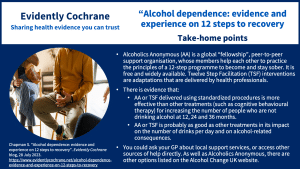In a blog for anyone worried about their drinking, or supporting someone with alcohol dependence, Sarah Chapman from Cochrane UK looks at evidence for the effectivenessThe ability of an intervention (for example a drug, surgery, or exercise) to produce a desired effect, such as reduce symptoms. of Alcoholics Anonymous (AA) and other 12 step programmes, and hears from some people with experience of becoming sober through AA.
Take-home points

“I was living in terror. Every single minute of every day.” “I was an all-day drinker, from when I got out of bed until I passed out, and I just wanted to continue doing that until I died.” Niam and Rhys share their experiences of struggling with alcohol dependence, and recovering with the help of Alcoholics Anonymous (AA), in the BBC documentary I’m an alcoholic: inside recovery. I watched this with particular interest, knowing that a family member has been sober for fifty years through seeking help from AA, and knowing that the Cochrane ReviewCochrane Reviews are systematic reviews. In systematic reviews we search for and summarize studies that answer a specific research question (e.g. is paracetamol effective and safe for treating back pain?). The studies are identified, assessed, and summarized by using a systematic and predefined approach. They inform recommendations for healthcare and research. Alcoholics Anonymous and other 12‐step programs for alcohol use disorder (March 2020) has reliable evidence that this approach works – and better than other treatments. This isn’t the same thing as saying it will work for everyone, but we’ll come back to the evidence in a moment.
A bit about Alcoholics Anonymous
Alcoholics Anonymous (AA) is a global “fellowship” of people who have in common personal experience of alcoholism and problem drinking and offer peer support to help members become and stay sober. All you need to be a member is a desire to stop drinking. AA is both free and widely available, and meetings are held in community buildings such as churches. In these meetings, members share their addiction and recovery experiences and help each other to practice the principles of a 12-step programme – with no time limit for completing it.
In the documentary, Dr Wendy Dossett (Associate Professor of Religious Studies at the University of Chester) explains that “The steps begin with this concept of powerlessness and the idea of accessing a higher power, whatever that means for that person.” AA has Christian roots (it began in the United States in the 1930s), but every member is invited to choose their own ‘higher power’. One AA member says, “For me, that higher power is Mother Nature”; another that it is “something within me that is stronger than me, and that’s what guides my everyday life”.

The Big Book, the basic text for AA with personal stories and practical information on The 12 Steps, also dates back to the 1930s, but many people are finding it helpful still, interpreting it in the context of their own lives. AA member Rhys comments “This book contains the key for a chronicA health condition marked by long duration, by frequent recurrence over a long time, and often by slowly progressing seriousness. For example, rheumatoid arthritis. alcoholic like me to live life sober and actually have a good life. It’s a way of living that really works.”
While meetings include ‘the share’, with someone talking about their experience of struggling with alcohol and their journey to sobriety, people can speak up or not as they choose. “The realisation that you’re not alone is a remarkable revelation,” says Tom Fox, non-alcoholic Trustee of AA. Member Niam says “From that first meeting I got that feeling of hope”.
The evidence for AA and other 12 step programmes
As well as people’s stories of being helped through AA, there is also evidence of its effectiveness from rigorous research. The authors of the Cochrane Review brought together the best available evidence (from 27 studies with over 10,500 people) on AA and Twelve Step Facilitation interventions (TSF).
TSF interventions have adapted elements of the AA approach and aim to connect people with AA groups. They are delivered by health professionals. Some of these programmes follow procedures set out in a manual and some do not standardize their programmes in this way. This was taken into consideration in the review.
The studies compared AA and TSF programmes with treatments with a different theoretical basis, such as cognitive behavioural therapy (CBT).
Here’s what they found:
- AA or TSF delivered using a manual is more effective than other treatments such as cognitive behavioural therapy for increasing abstinence at 12, 24 and 36 months. This is based on high-certaintyThe certainty (or quality) of evidence is the extent to which we can be confident that what the research tells us about a particular treatment effect is likely to be accurate. Concerns about factors such as bias can reduce the certainty of the evidence. Evidence may be of high certainty; moderate certainty; low certainty or very-low certainty. Cochrane has adopted the GRADE approach (Grading of Recommendations Assessment, Development and Evaluation) for assessing certainty (or quality) of evidence. Find out more here: https://training.cochrane.org/grade-approach evidence, so we can feel confident about this result.
- AA or TSF programmes that aren’t standardized by following a manual may be as good as these other treatments for increasing abstinence, and similar in their impact on complete abstinence at three to nine months, and on drinking intensity. They may be slightly better than other treatments in terms of the percentage of drinking days.
- AA or TSF, with or without using a manual, is probably as good as other treatments in its impact on the number of drinks per day and on alcohol-related consequences.
- It is less clear how treatments compare in terms of the percentage of days when people don’t drink alcohol, the longest period of abstinence, or days of heavy drinking, as the evidence was not so reliable.
- The studies did not look at the effect of treatmentSomething done with the aim of improving health or relieving suffering. For example, medicines, surgery, psychological and physical therapies, diet and exercise changes. on quality of life, functioning, or psychological well‐being.
How do peer-led AA and professionally run TSF compare?
In this review, AA and TSF were looked at together and compared with other treatments, so it can’t tell us how they compare with each other. In the documentary, Dr Ed Day, NHS Consultant Psychiatrist, points out that AA has a huge advantage – “it’s always there. It’s running wherever you are… By necessity, professional services tend to be time limited. You go for a period of treatment, it lasts for a certain period of time, it finishes, you move on. AA on the other hand runs 24/7 and it’s doing it in a way that’s community based. So it’s saying that you can’t build and maintain that recovery by accessing treatment services all the time, you have to do it in the real world, and that’s what AA does.”
AA works for many, but it’s not for everyone
Dr Day also stresses that problems with alcohol are often complex and may have taken years to develop, and that there is no simple solution, no one way of overcoming problems with alcohol and developing recovery.
Dr Louise Foxcroft, also interviewed in the documentary, comments that “AA doesn’t work for everybody. And it does mean a huge commitment, and it means a lifelong commitment, and it means changing the way you think, changing the way you operate and changing the way you behave.”
Some who start the 12 step programme drop out part way through. Some will give it another go later on. Some continue to engage with AA throughout their lives, as my relative has done.
AA member Rhys on sobriety:
“It’s freedom, it’s total freedom, is what sobriety is. I’ve recovered, but I’m not cured. I’m just keeping my alcoholism at bay. I’m rebuilding into a person that can look in the mirror and be alright with what’s looking back at me. And that’s a miracle. I’m awake. I’ve got a zest for life. I’ve got direction. I’m not lonely anymore.”
For more information and support
- Alcoholics Anonymous (AA)
- Alcohol Change points to various sources of support for people in the UK. It also has some helpful information about the language around alcohol harms on their page How do we talk about alcohol?
- There are local treatment services such as Turning Point Roads to Recovery in Oxfordshire and Lothians and Edinburgh Abstinence Programme (LEAP) in Scotland. You could ask your GP what’s available in your area.
- Rehab 4 Addiction is an advisory and referral service for people who suffer from alcohol, drug and behavioural addiction. It offers resources and information about addiction and mental health, a helpline that offers immediate assistance to those struggling with addiction, and a comprehensive directory of treatment centres throughout the UK, to find help near you.
The Cochrane Review: Kelly JF, Humphreys K, Ferri M. Alcoholics Anonymous and other 12‐step programs for alcohol use disorder. Cochrane Database of Systematic ReviewsIn systematic reviews we search for and summarize studies that answer a specific research question (e.g. is paracetamol effective and safe for treating back pain?). The studies are identified, assessed, and summarized by using a systematic and predefined approach. They inform recommendations for healthcare and research. 2020, Issue 3. Art. No.: CD012880. DOI: 10.1002/14651858.CD012880.pub2.
You can join in the conversation on Twitter with @CochraneUK @SarahChapman30 or leave a comment on the blog.
Please note, we cannot give specific medical advice and do not publish comments that link to individual pages requesting donations or to commercial sites, or appear to endorse commercial products. We welcome diverse views and encourage discussion but we ask that comments are respectful and reserve the right to not publish any we consider offensive. Cochrane UK does not fact-check – or endorse – readers’ comments, including any treatments mentioned.
Sarah Chapman has nothing to disclose.


